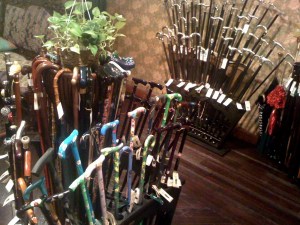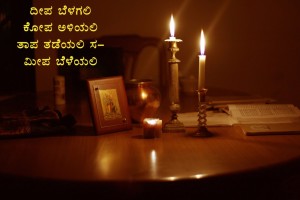I saw a speciality walking stick store in the Hiltopia mall in Shinjuku this morning. The lady, Ms Nagae, told me it’s the only one of its kind in Tokyo and 26 years old! Visit http://www.Chaplin.co.jp. I am going to post a video clip of Poirot’s elegant and expressive silver-topped stick the moment I’m back home.
Archive for October, 2009
The walking stick
Posted by rsachi on October 31, 2009
Posted in The walking stick Hercule Poirot Charlie Chaplin Hilton Tokyo Shinjuku | Leave a Comment »
The dance of Shiva
Posted by rsachi on October 27, 2009
(scripted using Baraha)
In my previous post, there is a link to Pandit Chhannulal Misra’s recitation of the sutra to indicate how Shiva is the originator of our music and literature.
I loved this sloka and researched it. I reproduce below the quote from kamakoti.org; the explanation of the sloka is presumably by the Sage of Kanchi:
Nrttavasane Nataraja-rajo nanada dhakkam navapancavaram
Uddhartukamah Sankadisiddhanetadvimarse SivasutrajalamI will speak briefly about this stanza. The silent Siva remains still [as Daksinamurti]. But the same Siva [in another form of his] keeps dancing all the time and it was from his dance that the science of language was born.
Nataraja is the name of the dancing Paramesvara. “Nata” is a member of a troupe which also consists of the “vita” and “gayaka”. The nata dances. Nataraja is the king of all dancers– he who cannot be excelled as a dancer– and he is also called Mahanata [the great dancer].
“Nrttavasane. . . ” Nataraja performs an awe- inspiring dance. It seems to bring together all the dance that all of us have to perform, the rhythms of all our lives.
Nataraja has a drum in one hand, called the dhakka or damaruka. The tala of this drum (the time kept by it) is in keeping with the “footwork” of the dancing god, the movement of his feet. The beat of his drum is referred to in the words, “nanada dhakkam”.
When Nataraja dances, Sanaka and his brother sages, Patanjali Vyaghrapada and so on stand round him. They are great ascetics, so they are able to see the dance. At the close of the dance, the concluding beats(cappu) produced fourteen sounds. It is these fourteen that are referred to in the stanza (“Nrttavasane”, etc) as “navapancavaram”; “nava” is nine and “panca” is five, so fourteen in all. “Nanada dhakkam navapancavaram.
The fourteen sounds produced by Nataraja’s drum are the means by which the reality of Siva is to be known and experienced within us in all its plenitude. Nandikesvara has commented upon the fourteen sounds in his Sivabhaktisutra.
The fourteen sounds are recited at the upakarma ceremony. Since they emanated from the drum of Mahesvara(Nataraja), they are called “Mahesvarasutras”. Human beings can produce only inarticulate sounds on the musical instruments played by them. The hand of Paramesvara is verily the Nadabrahman and Sabdabrahaman incarnate, so his cappu on the damaruka at the conclusion of his tandava sounded as a series(garland) of fourteen letters:
1. a i un; 2. rlk; 3. e on; 4. ai auc; 5. hayavarat; 6. lan; 7. nama nana nam; 8. jha bha n; 9. gha da dha s; 10. ja ba ga da da s; 11. kha pha cha tha tha catatav; 12. kapay; 13. sa sa sar; 14. hal-iti Mahesvarani sutrani.
Though the musical instruments do not produce articulate sounds, they create the impression of producing the phonemes of human speech. If this be so in the case of instruments played by humans, why should not the drum beaten by Nataraja during his pancakrtya dance produce articulate sounds?How did Panini make use of the fourteen sounds? He created an index from the sutras to vocalise the letters or syllables together. According to the arrangement made by him, the first letter or syllable of a sutra voiced with the last letter or syllable of another sutra will indicate the letters or syllables in between. For example, the first syllable of “hayavarat”, “ha”, and the last letter of “hal”, “l”, together make “hal”. This embraces all the consonants in between. Similarly, the first letter of the first sutra, “a”, and the last letter of the fourth sutra together form “ac”-this includes all the vowels. The first letter of the first sutra and the last letter of the fourteenth sutra together form “al” – it includes all letters. “Halantasya” is one of the sutras of Astadhyayi. “Al” itself has come to mean writing. “A-kara” is the first letter in all languages. In Urdu it is alif; in Greek it is alpha. Both are to be derived from “al”. So too “alphabet” in English. Here is another fact to support the view that, once upon a time, the Vedic religion was prevalent all over the world.
We know thus that the prime source of grammar is constituted by the Mahesvara-sutras emanating from the drum of Nataraja.
Posted in the origin of music sanskrit grammar Shiva Siva drum cosmic dance sage of Kanchi Prambanan Indonesia | Leave a Comment »
Singer extraordinary – Pandit Chhannulal Misra
Posted by rsachi on October 25, 2009
Posted in great Hindustani music Chhannulal Mishra pandit Channulal Misra Chhannulaal Mishra Maru Behag Benaras Banares Kirana gharana Hindustani music Bhimsen Joshi Thumri | Leave a Comment »
Agatha Christie’s Poirot
Posted by rsachi on October 24, 2009
Watch the You Tube video. I am sure you will soon grab the DVDs!
Here is a link in Wikipedia
Posted in Sachi_R rsachi Agatha Christie DVD Hercule Poirot BBC Accorn David Suchet 1989 period art deco famous detective excellent drama | Leave a Comment »
Todi on the Mridangam – Umayalpuram K Sivaraman
Posted by rsachi on October 23, 2009
Posted in Umayalpuram Sivaraman mridangam veena Emani Sankara Sastry AIR Todi maestro concert | Leave a Comment »
Ten do’s for enjoying Carnatic music
Posted by rsachi on October 18, 2009
I have listed here the ten things I have learnt over time that will make me enjoy Carnatic music more deeply and lingeringly:
- Be on time for the concert.
- Buy a ticket.
- Respect each artiste- every moment of music is a gift- fresh and enjoyable.
- Listen. Don”t sing along.
- Keep your knowledge to yourself. Don’t try to impress others.
- If you do put tala, be discreet and correct.
- Listen totally. No chat, paper or mag.
- No toilet break.
- Applaud if you enjoy. It is a good exercise.
- Go home and savour the lyric later. It is a good after-taste.
Posted in Sachi_R rsachi Carnatic music Karnatak music do's to enjoy a concert enjoy Carnatic music more deeply and lingeringly | Leave a Comment »
Gandhi and Obama
Posted by rsachi on October 12, 2009
The same frayed sandals that carried St. Gandhi on his illegal salt march through India 19 months ago carried him last week up the crimson-carpeted stair of Buckingham Palace. Flunkies in scarlet & gold bowed the small, unrepentant lawbreaker into the Picture Gallery. There at the head of the receiving line stood George V in striped trousers and morning coat, Queen Mary in a shimmering silver tea gown and Edward of Wales (who had flown down especially from Liverpool) dressed like his father. The Lord Cham berlain, the Earl of Cromer, advanced through a horde of 500 tea guests, some of them Maharajas wearing pearls as big as butterballs.
“Mahatma Gandhi!” announced the Lord Chamberlain. George V at once looked up. The sandals carried the Saint to His Majesty who stretched out a royal hand. Mr. Gandhi took it firmly, shook it warmly. He then placed his own hands palm to palm, bowed to Their Majesties as a Hindu priest bows when imparting benediction.
Queen Mary smiled approvingly. Mr. Gandhi was not in “morning dress” as the royal invitation had requested (TIME, Nov. 9) but he was wearing a loincloth wider by a thumb’s breadth than usual, and a shawl of homespun. Queen Mary saw nothing unseemly, betrayed the merest flicker of interest as she espied the Mahatma’s dangling dollar watch.
King George drew Guest Gandhi into the royal study. There the King-Emperor took a dish of tea, the Mahatma sucked in a bowl of goat’s milk sent up from the palace kitchen.
Among buzzing guests in the Picture Gallery several startled the rest by recalling that this was not the first Gandhi-George V meeting. In 1901 the Indian community of Durban, South Africa welcomed the then Duke & Duchess of York, now Their Majesties, with a reception at which Lawyer M. K. Gandhi made the principal address. In 1901 impotent Ad- dresser Gandhi was bedight in the latest British fashion. Last week potent St. Gandhi created a sensation by leaving the royal teaparty before no other guest. “Personally I have very little time for social functions,” said he. “Both Their Majesties were charming. I also liked the Prince of Wales.”
British Reporter: Did the King give any encouragement to your hope for Indian independence?
St. Gandhi: Only God gives encouragement, not Kings.
Badgered by correspondents to tell what his host had talked about, Guest Gandhi replied, “It would not be dignified for me to tell you what the King said,” and explained why.
“Our conversation consisted mostly of pleasantries. There were questions and answers about the weather and its effect on a man so recently come from India as myself.”
Shortly from Bombay the Mahatma received a cable signed by leading spirits of his Indian National Congress. They begged him to quit the Indian Round Table Conference in London because it has shown no sign of recommending independence for India. Promptly St. Gandhi announced: “I will sail for Bombay from Genoa on the 29th. … I feel that I’m wasting my time here, but I’m willing to stay in London until the end of the Conference, which I expect will be in a fortnight. Then nobody can accuse me of impatience.”
Posted in Time magazine Mahatma Gandhi Nobel Peace Prize Gandhi and Obama Peace U.K. King George Queen Mary St. Gandhi M. K. Gandhi | Leave a Comment »








